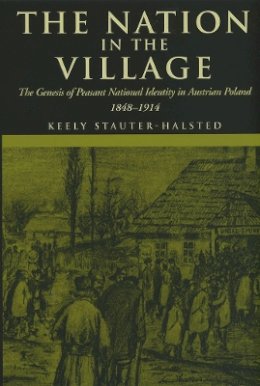
The Nation in the Village. The Genesis of Peasant, National Identity in Austrian Poland, 1848-1914.
Keely Stauter-Halsted
How do peasants come to think of themselves as members of a nation? The widely accepted argument is that national sentiment originates among intellectuals or urban middle classes, then "trickles down" to the working class and peasants. Keely Stauter-Halsted argues that such models overlook the independent contribution of peasant societies. She explores the complex case of the Polish peasants of Austrian Galicia, from the 1848 emancipation of the serfs to the eve of the First World War.
In the years immediately after emancipation, Polish-speaking peasants were more apt to identify with the Austrian Emperor and the Catholic Church than with their Polish lords or the middle classes of the Galician capital, Cracow. Yet by the end of the century, Polish-speaking peasants would cheer, "Long live Poland" and celebrate the centennial of the peasant-fueled insurrection in defense of Polish independence.
The explanation for this shift, Stauter-Halsted says, is the symbiosis that developed between peasant elites and upper-class reformers. She reconstructs this difficult, halting process, paying particular attention to public life and conflicts within the rural communities themselves. The author's approach is at once comparative and interdisciplinary, drawing from literature on national identity formation in Latin America, China, and Western Europe. The Nation in the Village combines anthropology, sociology, and literary criticism with economic, social, cultural, and political history.
Product Details
About Keely Stauter-Halsted
Reviews for The Nation in the Village. The Genesis of Peasant, National Identity in Austrian Poland, 1848-1914.
Slavic and Eastern European Review
Insightful and innovative... Stauter-Halsted's book is a fine example that draws on a dazzling array of printed and archival sources to reveal what peasants themselves were saying, writing, thinking, and dreaming about any future Polish nation.... The fresh approach to the village and identity will make a strong contribution to the literature on nationalism, peasant studies, and the public sphere. it should be essential reading for anyone interested in modern Europe, the peasantry, and national identity.
H-Net Reviews
Keely Stauter-Halsted's new monograph combines the best of intellectual worlds: it is not only richly informed by theoretical and historical works on identity formation, civil society, subaltern studies, peasant nationalism, and cultural studies but by extensive materials from archives in Warsaw, Krakow, and Lvov. The result of her intellectual efforts in an insightful study of the political, social, and cultural transformation of Galician serfs into members of the Polish nation during the postemancipation period and how the peasants themselves were instrumental in this transformation.... She set the bar quite high for those who wish to investigate the creation, establishment, and maintenance of a Polish national identity.
Slavic Review
This study makes an important contribution to the growing literature on nationalism in Eastern Central Europe.
Polish Review
This volume makes a major contribution to the ever-growing literature of nationalism by emphasizing the plurality and dynamism of the process. It is well illustrated and indexed and includes an excellent bibliography.
Choice
